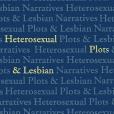《Heterosexual Plots and Lesbian Narratives (The Cutting Edge》是NYU Press出版的圖書,作者是Marilyn Farwell。
基本介紹
- 中文名:Heterosexual Plots and Lesbian Narratives (The Cutting Edge
- 作者:Marilyn Farwell
- 出版時間:1996年1月1日
- 出版社:NYU Press
- 頁數:248 頁
- ISBN:9780814726402
- 裝幀:Paperback
- 價格:USD 27.00
內容簡介
Marilyn Farwell's thoughtful and highly readable text is the first to look at lesbian writing from the perspective of narrative theory, not content, social context, or critical theory. By positioning herself between essentialist lesbian feminism and anti-essentialist postmodernism, she provides a strong case for refusing simplistic oppositions and redrawing the lines of contemp...(展開全部) Marilyn Farwell's thoughtful and highly readable text is the first to look at lesbian writing from the perspective of narrative theory, not content, social context, or critical theory. By positioning herself between essentialist lesbian feminism and anti-essentialist postmodernism, she provides a strong case for refusing simplistic oppositions and redrawing the lines of contemporary lesbian criticism. A provocative and enjoyable approach to lesbian literature. Bonnie Zimmerman San Diego State University. What is lesbian literature? Must it contain overtly lesbian characters, and portray them in a positive light? Must the author be overtly (or covertly) lesbian? Does there have to be a lesbian theme and must it be politically acceptable? Marilyn Farwell here examines the work of such writers as Adrienne Rich, Marion Zimmer Bradley, Jeanette Winterson, Gloria Naylor, and Marilyn Hacker to address these questions. Dividing their writings into two genres - the romantic story and the heroic, or quest, story, Farwell addresses some of the most problematic issues at the intersection of literature, sex, gender, and postmodernism. Illustrating how the generational conflict between the lesbian- feminists of twenty years ago and the queer theorists of today stokes the critical fires of contemporary lesbian and literary theory, Heterosexual Plots and Lesbian Narratives concludes by arguing for a broad and generous definition of lesbian writing.

